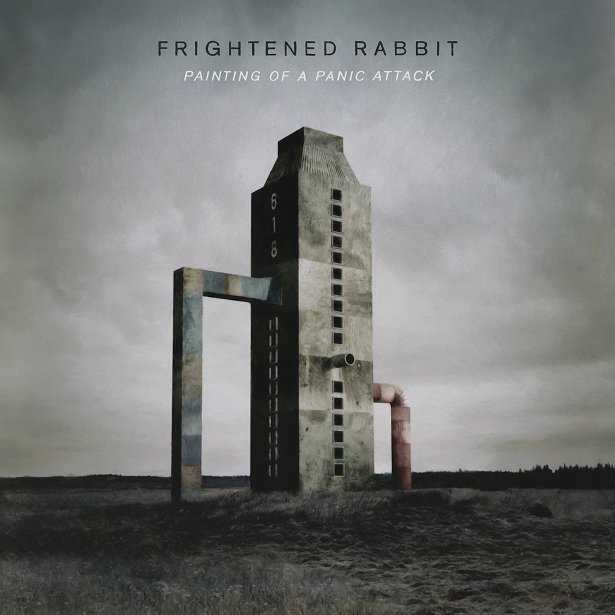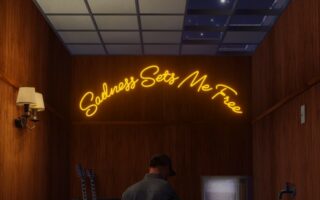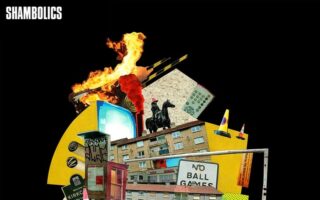
None of us really know what the consequences of fame would be, no matter what we dream.
For the members of Frightened Rabbit, the notion of celebrity is a relative one of course, but the success of their last album ‘Pedestrian Verse‘ – their first release on a major and well received on both sides of the Atlantic – has granted them at least the right to be recognised at bus stops further afield than their Selkirk home.
A band now, FR was once a solo vehicle for lead singer Scott Hutchison, so perhaps it’s fair that he felt the uncomfortable pang of attention more than anyone else. It caused a dislocation; having moved to LA in the wake of the last album’s success, the Scot quickly developed a love-hate relationship with the city whilst the greater absence overwrote the camaraderie and strong connections between him and his brother Grant (drums), Billy Kennedy (bass) and Andy Monaghan (guitar & keyboards).
All this upheaval notwithstanding, ‘Painting Of a Panic Attack‘ is both a powerfully together record and a genuine tilt at the seemingly vacant title formerly held by Elbow as perpetrators of grandiose arena confessionals. True, Hutchison’s world is harder than Guy Garvey‘s bleary-eyed sentimentality but, as the surly opener ‘Death Dream‘ proves, this stark lyrical outlook leaves fewer emotional cul-de-sacs to end up in.
Surely taking partial credit for some of the minor reinvention is producer Aaron Dessner, whose day job band The National have carved out a unique post-Americana niche that they share with the likes of Wilco and few others. Previously, FR’s gift was always that of eyes-closed exhalation. Now, perhaps through Dessner, they’ve added a stately sense of observation and a degree of understatement to their arsenal.
Not that the rumble lacks purpose; ‘Get Out‘ chronicles the torture of being drowned by obsessive love, reverb-laden guitars and pounding simplicity matching the fear and fury of being straitjacketed by someone else’s failure. Other places are more tranquil, as Hutchison confronts the humility of true addiction to those around the victim – “Forgive me, I can’t speak straight” – on ‘I Wish That I Was Sober‘, whilst the piano knuckles like a shot glass coming up empty for one last time.
On ‘Little Drum‘, this gravity weighs down on the shoulders even more, dolorous brass and swathes of melancholy standing offishly from words about mortality and emptiness.
For Hutchison then, these are times of little permanence, a lack of binding underlined on ‘Still Want To Be Here‘, his ode to the chaos and tainted beauty of Los Angeles, its unsettled country phrases echoing the author’s confused sense of belonging. It’s a backdrop to the creation of a record in which he began to draw similarities between the content and the concept of monuments and memorials, little changing rocks in the sea of accretion around them, with his words fighting the instruments to retain some kind of equilibrium.
In many ways this is the struggle of a man coming to terms with both his life and its surroundings in amongst the anonymity of a soulless vessel. There are no happy endings in that world or any other of course, much less the one realised on ‘Painting Of a Panic Attack’s final chapter, ‘Die Like a Rich Boy‘. On it, the singer muses on the affectation of, “If we leave this world in a Rhinestone shroud,” whilst a soporific cello hums the valedictory. Seemingly at one level about the famous being more celebrated in death than in life, it’s a coda which speaks both to the heightened vulnerability of those having their fifteen minutes and the absurdity of wanting, even after the end of existence, something more than others have.
Stone versus flesh: there’s always only one winner. Frightened Rabbit have defied separation to elevate their granite and eulogies to a point somewhere in between. Not permanent, but to be remembered as much at conception as its passing.
Not so much a painting then, but a photograph, a panorama which demands much further attention.




